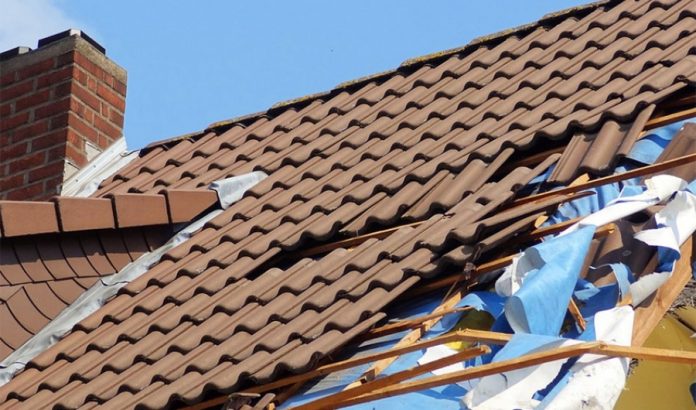Depending on where you live, storms are going to inevitably come. It’s important to be as prepared as possible for an upcoming storm season to minimize the potential damage to your home. However, not all damage is preventable, so you should also be prepared to get some repairs done on your home. Below are some tips to help you prevent storm damage as well as what to do if unpreventable damage occurs.
Remove Nearby Trees
If there are large trees within falling distance to your home that you have control over, cutting them down or cutting them back is a good choice. If there are no trees within falling distance to your home, that significantly decreases the odds of a tree falling through your roof or hitting the side of your home. There are, of course, freak accidents that can occur, but preventing storm damage is about removing the most likely causes of damage. If there are nearby branches that seem like they can cause significant damage if they detach from the tree, make sure to trim them along with any dead branches.
Check Your Roof Regularly
Your roof is one of the spots that is hardest hit when it comes to a storm. That’s why it’s very important to have your roof get inspected regularly to make sure that it isn’t damaged. Things like weaknesses in the structure and missing shingles can make it easy for a storm to end up causing water or another form of damage. If you notice any missing shingles, make sure to replace them as soon as possible to prevent water from seeping through your roof during the next storm.
Fix Any Loose Siding
Similar to missing shingles, loose or missing siding can create an easy opportunity for water to get where it isn’t supposed to be and cause damage. If you notice that there are any pieces of loose siding on your home, make sure to contact a repair service to fix it before the next time a storm hits. The right storm could rip off a piece of siding altogether, leading to more expensive repair costs and more substantial damage.
Make Sure Your Gutters Are Clean
Your gutters are the first line of defense against an onslaught of water from a storm, so it’s important to make sure that you’re properly cleaning them. If a gutter is blocked, it can cause water to overflow and end up running along your home instead of being directed away as it’s supposed to. You should also make sure that your gutter’s spouts are facing away from the foundation of your home. This will help to decrease the odds of your home’s basement flooding since the water will not be flowing directly towards your home’s foundation. If you have a garden that needs a lot of watering, placing rain collection barrels at the bottom of your gutter spout is a great way to both prevent flooding and reduce the amount of water you use to maintain your garden.
Make Sure Your Basement Is Waterproof
98% of homes with basements experience some form of water damage in them, which is why making sure that your basement is properly waterproof is so important. Once you’ve ensured that your gutters will direct water away from your home’s foundation, you aren’t done worrying about water damage in your basement. There are certain paints and sealants made specifically to prevent water damage in basements, and using them is a great option. You may also need a dehumidifier depending on the climate you live in to decrease the humidity in your basement and lessen the chances of mold or mildew building up over time.
Contact Your Insurance Company
If your home does sustain damage during a storm, make sure that the first thing you do is contact your insurance agency about the problems that you’re encountering. Your insurance company might have certain contractors that they recommend or will only cover certain types of repairs. If there is an emergency repair that needs to be made before you can get in contact with your insurance agency, make sure to keep all of your receipts so that you can be reimbursed by your home insurance company.
Check For Water Damage
When it comes to water damage, there are three types: damage from clean water, damage from greywater, and damage from black water. Clean water is, of course, water that would come out of a faucet and is completely clean. Greywater is the water that would drain out of a sink or shower and is relatively clean, especially in comparison to black water or wastewater. If a storm damages pipes in your home, you may be dealing with water damage from any of these water types, so make sure to get a plumber to check out your pipes as soon as you notice any leaks from them. Damage to pipes or plumbing may not be immediately apparent after a storm, so make sure that you’re checking them to ensure everything is in working order.
Look For Companies That Specialize in Storm Damage
When you’re getting your repairs done, look for companies that have experience in repairing damage caused by storms. A quick google search will be able to reveal some options for you, but there’s no need to scroll too far — less than 1% of those that search on Google use results from the second page or beyond. If the repairs you need done are not an emergency situation — like a tree through your roof — you can take a little bit of time to get quotes from a few companies on repairing the damage.
Storms themselves can’t be stopped or prevented, but you do have the ability to prevent a certain degree of storm damage by staying on top of your home’s maintenance. Noticing any spots that could potentially be damaged due to a storm and correcting those weaknesses can mean avoiding things like water damage. If you do sustain any storm damage, make sure to contact your insurance company and fix the damage as quickly as possible to prevent further damages.





